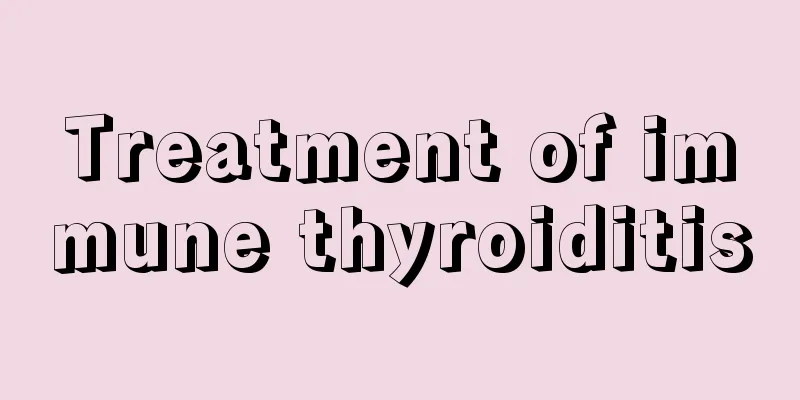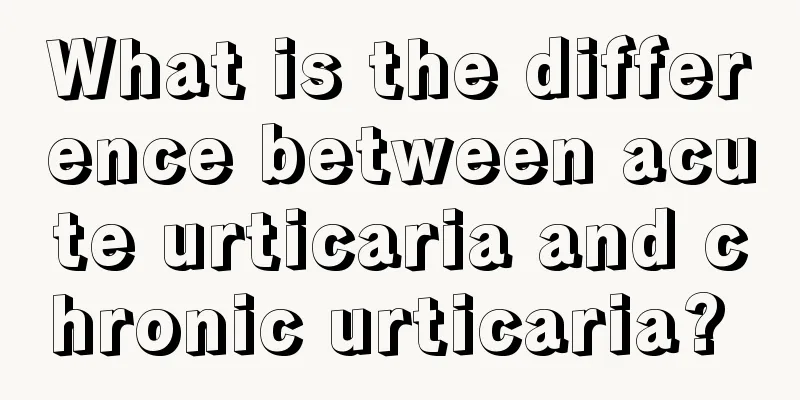Treatment of immune thyroiditis

|
The treatment of immune thyroiditis should be carried out symptomatically. Patients with dormant lymphocytic thyroiditis can be treated conservatively in the early stages and some anti-thyroid drugs can be used, because surgery and radiotherapy are not suitable at this time. 1. Silent lymphocytic thyroiditis The disease is transient, lasting only a few months; the hyperthyroid phase should be treated conservatively, usually with only beta-blockers. Antithyroid drugs, surgery, and radiation therapy are contraindicated. Transient hypothyroidism may require thyroid hormone replacement therapy. Although hypothyroidism may be permanent in some cases, most people return to normal thyroid function, so thyroid function should be reassessed after 6 to 12 months. 2. Subacute thyroiditis For more severe and prolonged cases, corticosteroids are recommended, and all symptoms will disappear within 24 to 48 hours. When thyroid radioiodine uptake returns to normal, treatment is terminated. 3. Acute thyroiditis Cold compress is suitable for local use in the early stage, hot compress is suitable for use in the late stage, and antibiotics are given systemically. When there is an abscess, incision and drainage should be performed early to prevent the abscess from rupturing into the trachea, esophagus, or mediastinum. Treatment includes antibiotics and local incision and drainage. It is best to do puncture fluid and blood culture, and perform drug sensitivity tests, and then choose sensitive antibiotics, which will be more effective in eliminating bacteria. After a few days of thyroid inflammation, an abscess will form. Therefore, the thyroid abscess must be incised and drained to effectively remove the pus and control the local inflammation as soon as possible. Because the neck pain is obvious, some pain-relieving drugs can be used. 4. Hashimoto’s thyroiditis Patients with mild thyroid enlargement and no symptoms may not need treatment but should be followed up and observed. When the thyroid gland is significantly enlarged or there is hypothyroidism, thyroid preparations should be given for treatment even if only serum TSH is elevated. If the thyroid gland enlarges rapidly or is accompanied by pain or compression symptoms, short-term glucocorticoid treatment can be used. Hashimoto's hyperthyroidism should be treated with low-dose antithyroid drugs, and 131 iodine and surgery are generally not used to avoid severe hypothyroidism. |
<<: Is hypertensive heart disease very serious?
>>: Can atrial septal defect cause pulmonary hypertension?
Recommend
How to choose beeswax
With the gradual development of science and techn...
How to treat accidental gallbladder cancer after surgery
Accidental gallbladder cancer refers to gallbladd...
Will eating eggplant reduce milk supply?
For many new mothers, they all want to breastfeed...
How to treat multiple aseptic inflammations in the spine
Aseptic inflammation is a typical manifestation o...
The efficacy and function of green crystal
Green crystal is a type of crystal. Its appearanc...
What causes swollen lymph nodes under the ear? Don't ignore
Swollen lymph nodes are a common phenomenon in da...
If melanoma manifests differently, the types will also be different
If the symptoms of melanoma vary from type to typ...
Can gastric cancer metastasize to the brain? It's possible
Gastric cancer is a malignant tumor that occurs i...
Does Poria cocos whiten the skin?
Poria cocos is indeed a very good medicinal mater...
How long can you live if colon cancer recurs
How long can you live with colon cancer? This is ...
How much does testicular cancer treatment cost
The cost of testicular cancer treatment is an iss...
What are the targeted drugs for treating advanced gastric cancer
What are the targeted drugs for treating advanced...
What is the difference between holding urine and not holding urine during color ultrasound?
Female friends often suffer from gynecological di...
Twenty days after giving birth, I feel itchy down there
Natural birth is the first choice for women, beca...
How to use winter melon to whiten and remove freckles
Winter melon is a very common vegetable and it is...









